Dissertation: Labor Laws in Telecommunication Sector of Sierra Leone
VerifiedAdded on 2022/09/01
|13
|2228
|21
Report
AI Summary
This report examines the employment and labor law regimes in Sierra Leone, specifically within the telecommunications sector, with a case study of Orange SL Limited. The research aims to understand the balance between employee and employer rights, considering issues such as unfair treatment, recruitment processes, organizational culture, and psychological hazards. The study employs a positivist research philosophy, descriptive research design, and a deductive research approach, utilizing online questionnaires for data collection and quantitative data analysis. The report explores the importance of labor laws, their application in Sierra Leone, and the existing relationships between employers and employees, offering recommendations for improvement. The findings are based on a review of literature and an analysis of the current labor landscape, addressing the challenges of fair treatment, work culture, and employee well-being within the sector. The report considers the impact of labor regulations in the telecommunication sector of Sierra Leone and provides a comprehensive overview of the research methodology.
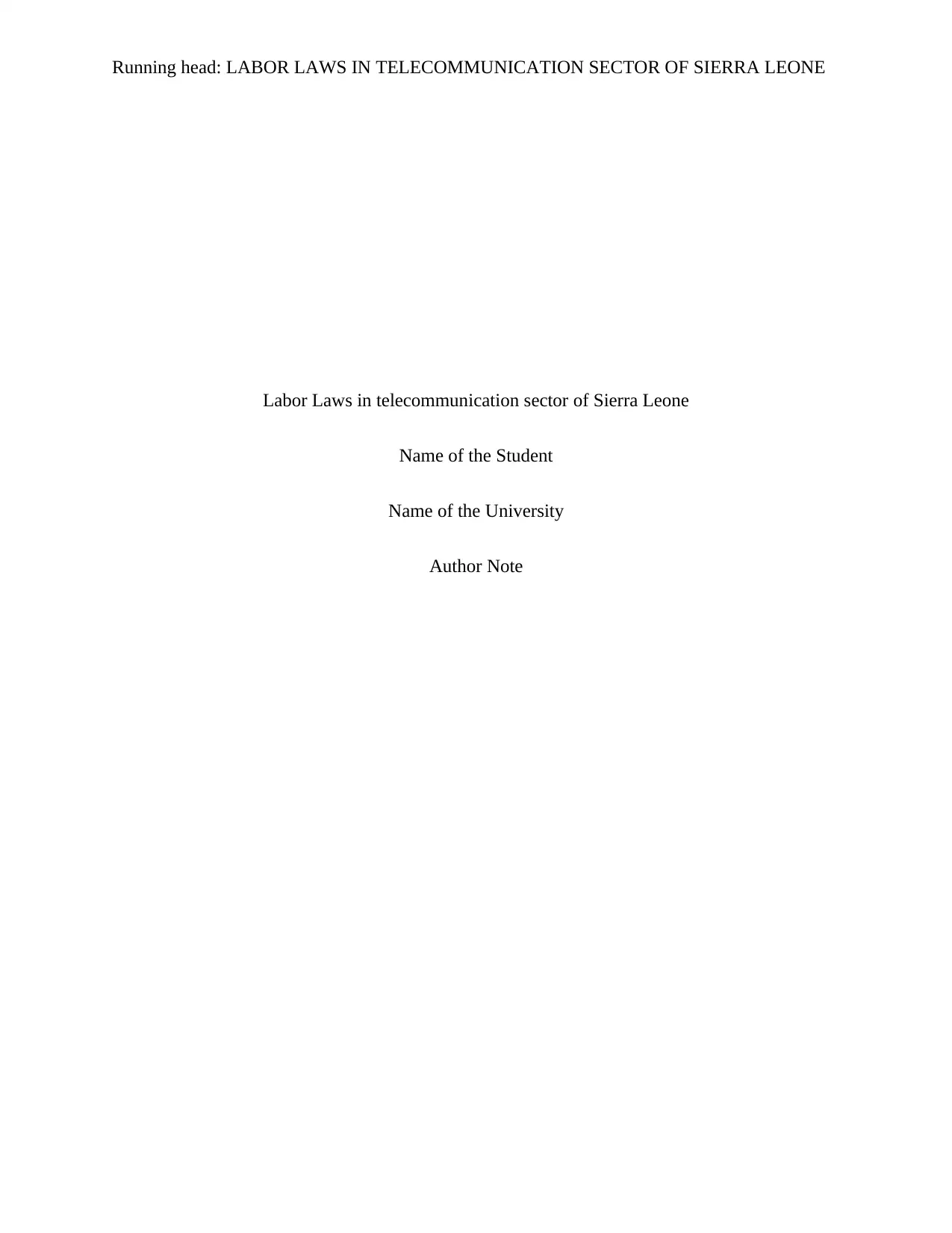
Running head: LABOR LAWS IN TELECOMMUNICATION SECTOR OF SIERRA LEONE
Labor Laws in telecommunication sector of Sierra Leone
Name of the Student
Name of the University
Author Note
Labor Laws in telecommunication sector of Sierra Leone
Name of the Student
Name of the University
Author Note
Paraphrase This Document
Need a fresh take? Get an instant paraphrase of this document with our AI Paraphraser
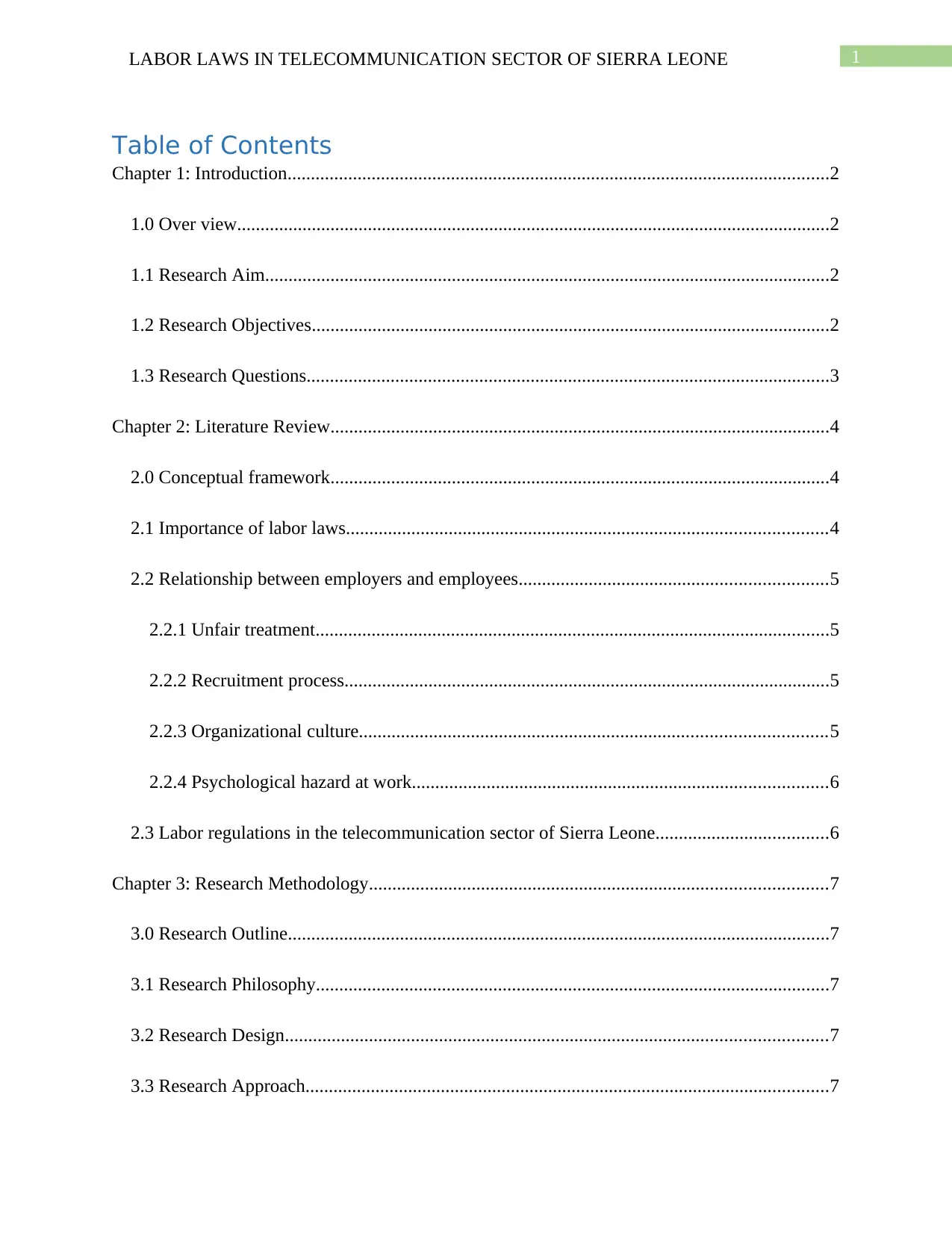
1LABOR LAWS IN TELECOMMUNICATION SECTOR OF SIERRA LEONE
Table of Contents
Chapter 1: Introduction....................................................................................................................2
1.0 Over view...............................................................................................................................2
1.1 Research Aim.........................................................................................................................2
1.2 Research Objectives...............................................................................................................2
1.3 Research Questions................................................................................................................3
Chapter 2: Literature Review...........................................................................................................4
2.0 Conceptual framework...........................................................................................................4
2.1 Importance of labor laws.......................................................................................................4
2.2 Relationship between employers and employees..................................................................5
2.2.1 Unfair treatment..............................................................................................................5
2.2.2 Recruitment process........................................................................................................5
2.2.3 Organizational culture....................................................................................................5
2.2.4 Psychological hazard at work.........................................................................................6
2.3 Labor regulations in the telecommunication sector of Sierra Leone.....................................6
Chapter 3: Research Methodology..................................................................................................7
3.0 Research Outline....................................................................................................................7
3.1 Research Philosophy..............................................................................................................7
3.2 Research Design....................................................................................................................7
3.3 Research Approach................................................................................................................7
Table of Contents
Chapter 1: Introduction....................................................................................................................2
1.0 Over view...............................................................................................................................2
1.1 Research Aim.........................................................................................................................2
1.2 Research Objectives...............................................................................................................2
1.3 Research Questions................................................................................................................3
Chapter 2: Literature Review...........................................................................................................4
2.0 Conceptual framework...........................................................................................................4
2.1 Importance of labor laws.......................................................................................................4
2.2 Relationship between employers and employees..................................................................5
2.2.1 Unfair treatment..............................................................................................................5
2.2.2 Recruitment process........................................................................................................5
2.2.3 Organizational culture....................................................................................................5
2.2.4 Psychological hazard at work.........................................................................................6
2.3 Labor regulations in the telecommunication sector of Sierra Leone.....................................6
Chapter 3: Research Methodology..................................................................................................7
3.0 Research Outline....................................................................................................................7
3.1 Research Philosophy..............................................................................................................7
3.2 Research Design....................................................................................................................7
3.3 Research Approach................................................................................................................7
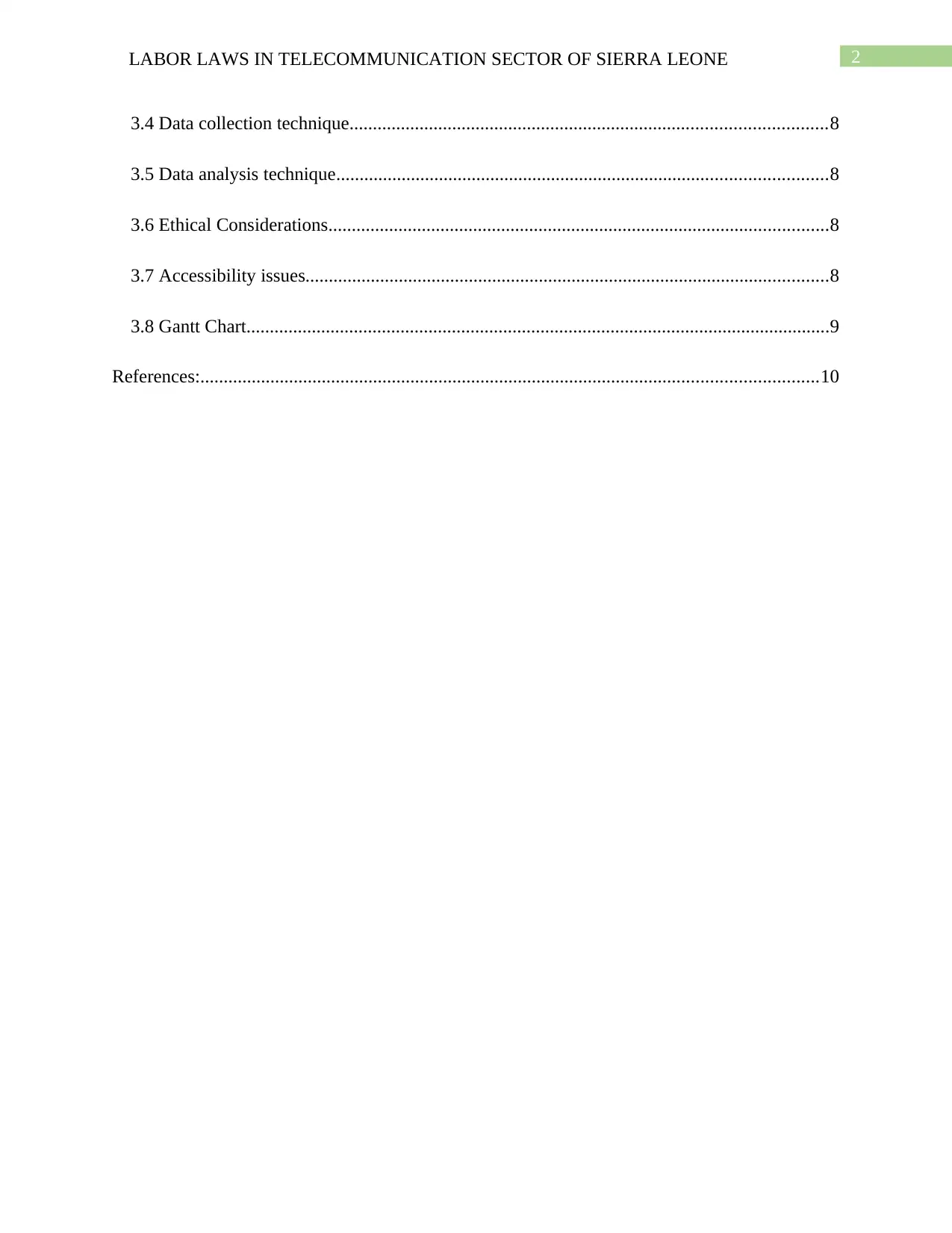
2LABOR LAWS IN TELECOMMUNICATION SECTOR OF SIERRA LEONE
3.4 Data collection technique......................................................................................................8
3.5 Data analysis technique.........................................................................................................8
3.6 Ethical Considerations...........................................................................................................8
3.7 Accessibility issues................................................................................................................8
3.8 Gantt Chart.............................................................................................................................9
References:....................................................................................................................................10
3.4 Data collection technique......................................................................................................8
3.5 Data analysis technique.........................................................................................................8
3.6 Ethical Considerations...........................................................................................................8
3.7 Accessibility issues................................................................................................................8
3.8 Gantt Chart.............................................................................................................................9
References:....................................................................................................................................10
⊘ This is a preview!⊘
Do you want full access?
Subscribe today to unlock all pages.

Trusted by 1+ million students worldwide
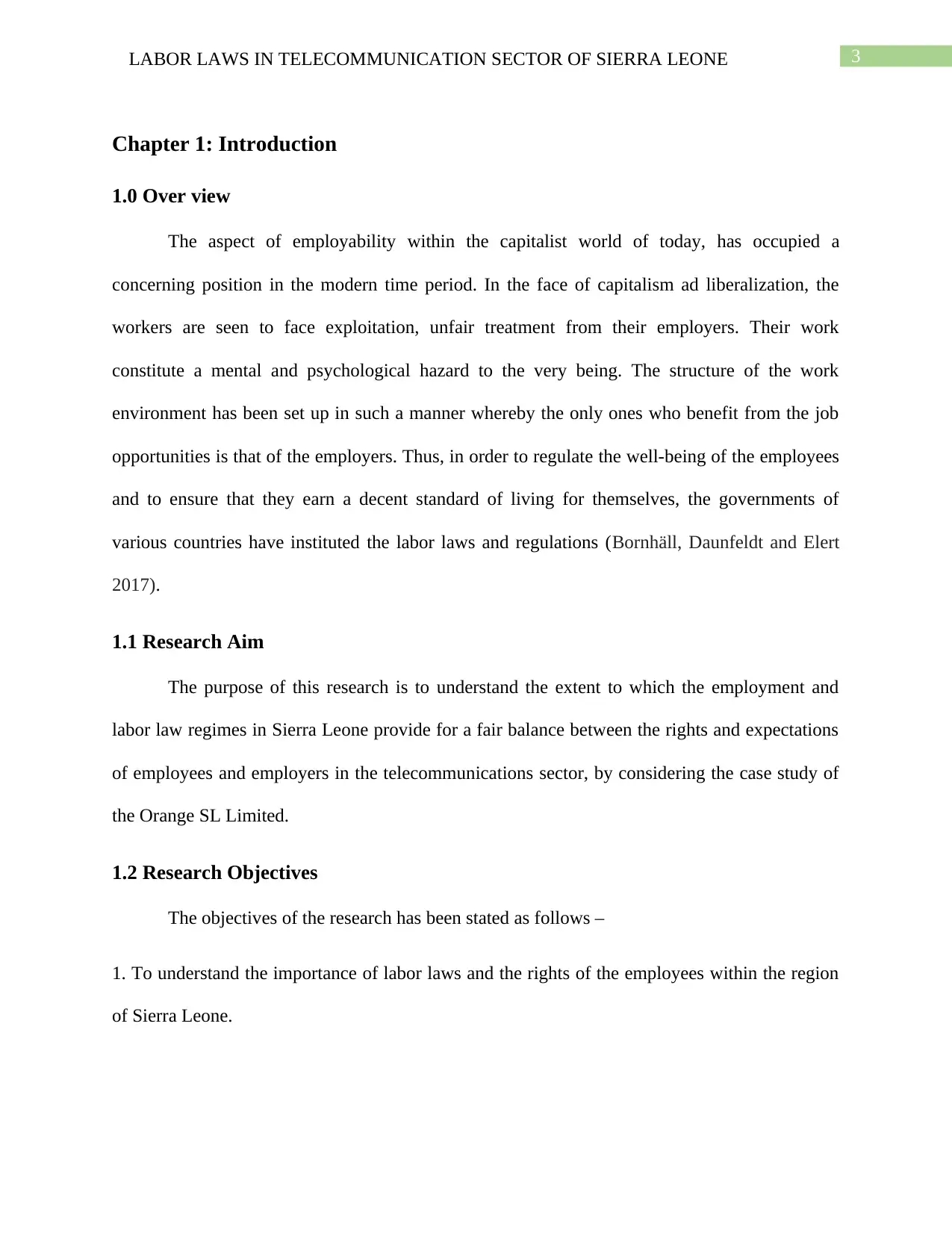
3LABOR LAWS IN TELECOMMUNICATION SECTOR OF SIERRA LEONE
Chapter 1: Introduction
1.0 Over view
The aspect of employability within the capitalist world of today, has occupied a
concerning position in the modern time period. In the face of capitalism ad liberalization, the
workers are seen to face exploitation, unfair treatment from their employers. Their work
constitute a mental and psychological hazard to the very being. The structure of the work
environment has been set up in such a manner whereby the only ones who benefit from the job
opportunities is that of the employers. Thus, in order to regulate the well-being of the employees
and to ensure that they earn a decent standard of living for themselves, the governments of
various countries have instituted the labor laws and regulations (Bornhäll, Daunfeldt and Elert
2017).
1.1 Research Aim
The purpose of this research is to understand the extent to which the employment and
labor law regimes in Sierra Leone provide for a fair balance between the rights and expectations
of employees and employers in the telecommunications sector, by considering the case study of
the Orange SL Limited.
1.2 Research Objectives
The objectives of the research has been stated as follows –
1. To understand the importance of labor laws and the rights of the employees within the region
of Sierra Leone.
Chapter 1: Introduction
1.0 Over view
The aspect of employability within the capitalist world of today, has occupied a
concerning position in the modern time period. In the face of capitalism ad liberalization, the
workers are seen to face exploitation, unfair treatment from their employers. Their work
constitute a mental and psychological hazard to the very being. The structure of the work
environment has been set up in such a manner whereby the only ones who benefit from the job
opportunities is that of the employers. Thus, in order to regulate the well-being of the employees
and to ensure that they earn a decent standard of living for themselves, the governments of
various countries have instituted the labor laws and regulations (Bornhäll, Daunfeldt and Elert
2017).
1.1 Research Aim
The purpose of this research is to understand the extent to which the employment and
labor law regimes in Sierra Leone provide for a fair balance between the rights and expectations
of employees and employers in the telecommunications sector, by considering the case study of
the Orange SL Limited.
1.2 Research Objectives
The objectives of the research has been stated as follows –
1. To understand the importance of labor laws and the rights of the employees within the region
of Sierra Leone.
Paraphrase This Document
Need a fresh take? Get an instant paraphrase of this document with our AI Paraphraser
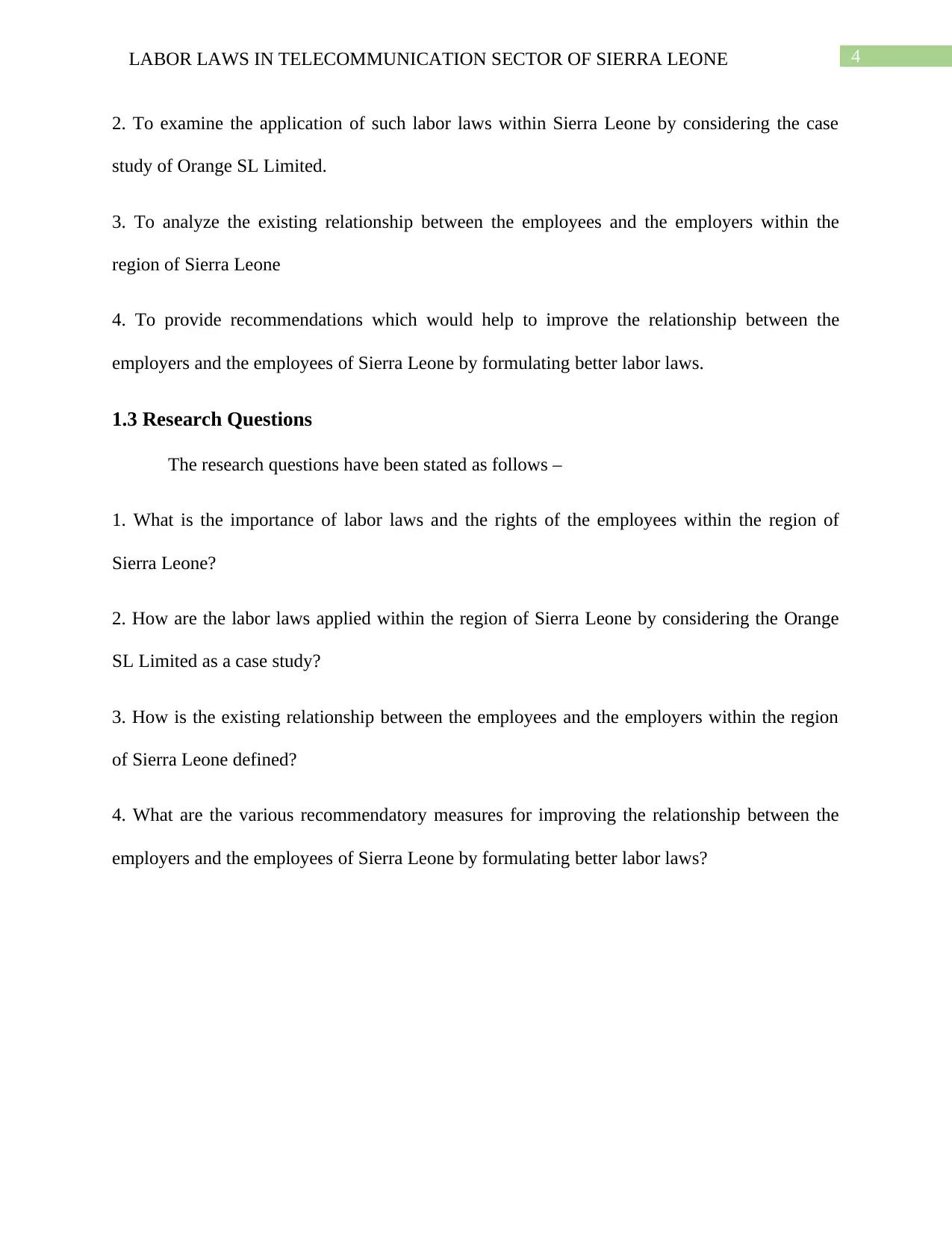
4LABOR LAWS IN TELECOMMUNICATION SECTOR OF SIERRA LEONE
2. To examine the application of such labor laws within Sierra Leone by considering the case
study of Orange SL Limited.
3. To analyze the existing relationship between the employees and the employers within the
region of Sierra Leone
4. To provide recommendations which would help to improve the relationship between the
employers and the employees of Sierra Leone by formulating better labor laws.
1.3 Research Questions
The research questions have been stated as follows –
1. What is the importance of labor laws and the rights of the employees within the region of
Sierra Leone?
2. How are the labor laws applied within the region of Sierra Leone by considering the Orange
SL Limited as a case study?
3. How is the existing relationship between the employees and the employers within the region
of Sierra Leone defined?
4. What are the various recommendatory measures for improving the relationship between the
employers and the employees of Sierra Leone by formulating better labor laws?
2. To examine the application of such labor laws within Sierra Leone by considering the case
study of Orange SL Limited.
3. To analyze the existing relationship between the employees and the employers within the
region of Sierra Leone
4. To provide recommendations which would help to improve the relationship between the
employers and the employees of Sierra Leone by formulating better labor laws.
1.3 Research Questions
The research questions have been stated as follows –
1. What is the importance of labor laws and the rights of the employees within the region of
Sierra Leone?
2. How are the labor laws applied within the region of Sierra Leone by considering the Orange
SL Limited as a case study?
3. How is the existing relationship between the employees and the employers within the region
of Sierra Leone defined?
4. What are the various recommendatory measures for improving the relationship between the
employers and the employees of Sierra Leone by formulating better labor laws?
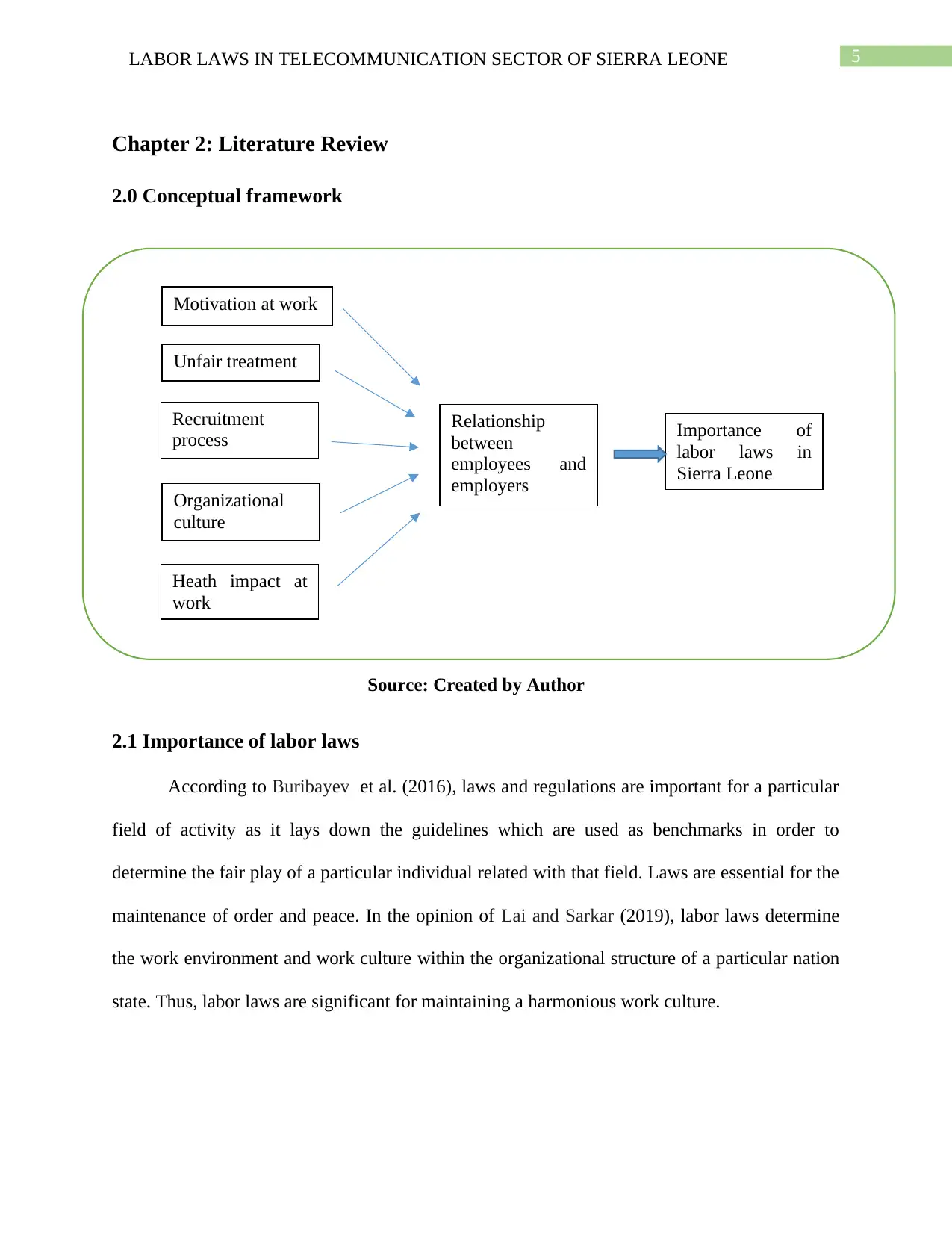
5LABOR LAWS IN TELECOMMUNICATION SECTOR OF SIERRA LEONE
Chapter 2: Literature Review
2.0 Conceptual framework
Source: Created by Author
2.1 Importance of labor laws
According to Buribayev et al. (2016), laws and regulations are important for a particular
field of activity as it lays down the guidelines which are used as benchmarks in order to
determine the fair play of a particular individual related with that field. Laws are essential for the
maintenance of order and peace. In the opinion of Lai and Sarkar (2019), labor laws determine
the work environment and work culture within the organizational structure of a particular nation
state. Thus, labor laws are significant for maintaining a harmonious work culture.
Motivation at work
Recruitment
process
Unfair treatment
Organizational
culture
Heath impact at
work
Relationship
between
employees and
employers
Importance of
labor laws in
Sierra Leone
Chapter 2: Literature Review
2.0 Conceptual framework
Source: Created by Author
2.1 Importance of labor laws
According to Buribayev et al. (2016), laws and regulations are important for a particular
field of activity as it lays down the guidelines which are used as benchmarks in order to
determine the fair play of a particular individual related with that field. Laws are essential for the
maintenance of order and peace. In the opinion of Lai and Sarkar (2019), labor laws determine
the work environment and work culture within the organizational structure of a particular nation
state. Thus, labor laws are significant for maintaining a harmonious work culture.
Motivation at work
Recruitment
process
Unfair treatment
Organizational
culture
Heath impact at
work
Relationship
between
employees and
employers
Importance of
labor laws in
Sierra Leone
⊘ This is a preview!⊘
Do you want full access?
Subscribe today to unlock all pages.

Trusted by 1+ million students worldwide
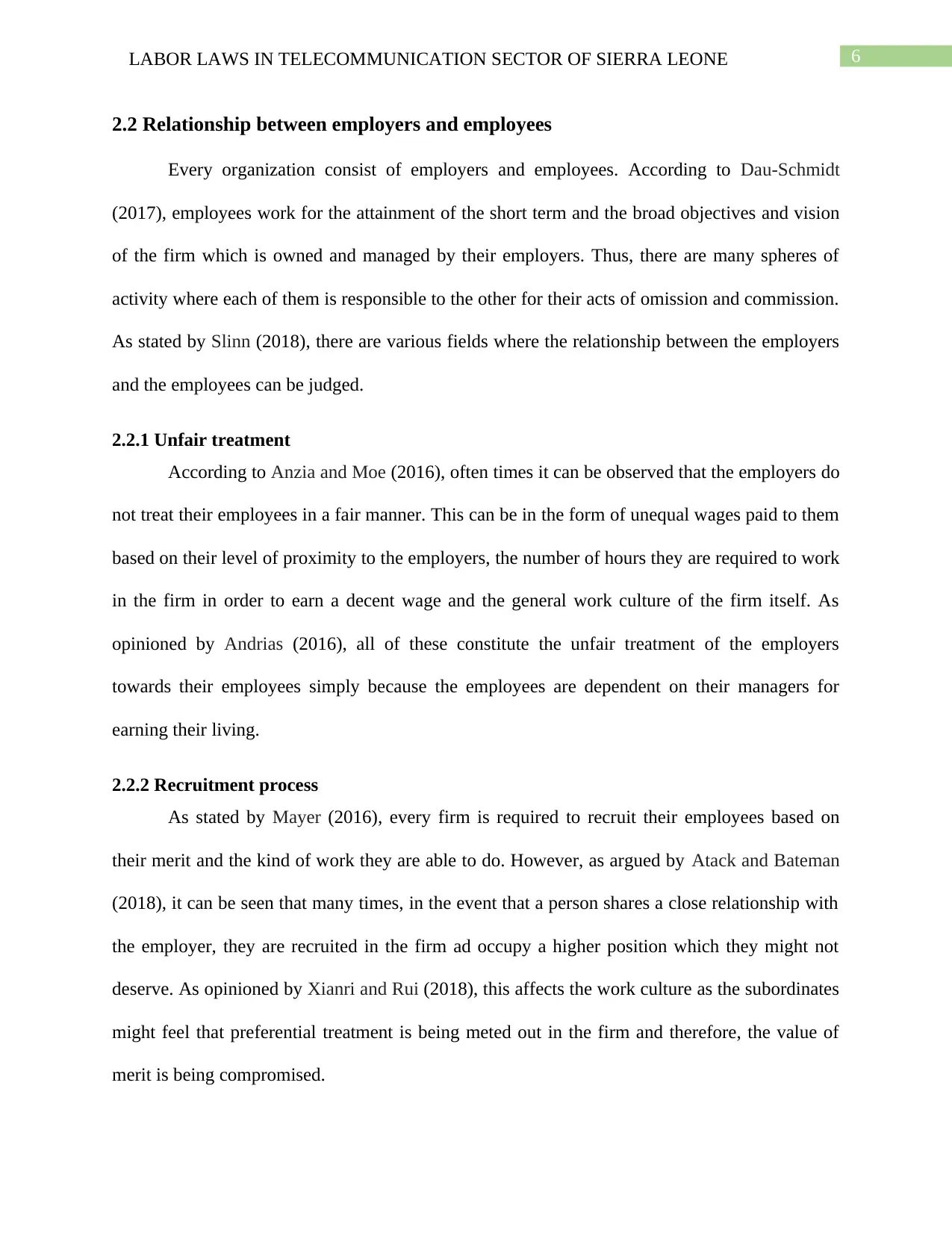
6LABOR LAWS IN TELECOMMUNICATION SECTOR OF SIERRA LEONE
2.2 Relationship between employers and employees
Every organization consist of employers and employees. According to Dau-Schmidt
(2017), employees work for the attainment of the short term and the broad objectives and vision
of the firm which is owned and managed by their employers. Thus, there are many spheres of
activity where each of them is responsible to the other for their acts of omission and commission.
As stated by Slinn (2018), there are various fields where the relationship between the employers
and the employees can be judged.
2.2.1 Unfair treatment
According to Anzia and Moe (2016), often times it can be observed that the employers do
not treat their employees in a fair manner. This can be in the form of unequal wages paid to them
based on their level of proximity to the employers, the number of hours they are required to work
in the firm in order to earn a decent wage and the general work culture of the firm itself. As
opinioned by Andrias (2016), all of these constitute the unfair treatment of the employers
towards their employees simply because the employees are dependent on their managers for
earning their living.
2.2.2 Recruitment process
As stated by Mayer (2016), every firm is required to recruit their employees based on
their merit and the kind of work they are able to do. However, as argued by Atack and Bateman
(2018), it can be seen that many times, in the event that a person shares a close relationship with
the employer, they are recruited in the firm ad occupy a higher position which they might not
deserve. As opinioned by Xianri and Rui (2018), this affects the work culture as the subordinates
might feel that preferential treatment is being meted out in the firm and therefore, the value of
merit is being compromised.
2.2 Relationship between employers and employees
Every organization consist of employers and employees. According to Dau-Schmidt
(2017), employees work for the attainment of the short term and the broad objectives and vision
of the firm which is owned and managed by their employers. Thus, there are many spheres of
activity where each of them is responsible to the other for their acts of omission and commission.
As stated by Slinn (2018), there are various fields where the relationship between the employers
and the employees can be judged.
2.2.1 Unfair treatment
According to Anzia and Moe (2016), often times it can be observed that the employers do
not treat their employees in a fair manner. This can be in the form of unequal wages paid to them
based on their level of proximity to the employers, the number of hours they are required to work
in the firm in order to earn a decent wage and the general work culture of the firm itself. As
opinioned by Andrias (2016), all of these constitute the unfair treatment of the employers
towards their employees simply because the employees are dependent on their managers for
earning their living.
2.2.2 Recruitment process
As stated by Mayer (2016), every firm is required to recruit their employees based on
their merit and the kind of work they are able to do. However, as argued by Atack and Bateman
(2018), it can be seen that many times, in the event that a person shares a close relationship with
the employer, they are recruited in the firm ad occupy a higher position which they might not
deserve. As opinioned by Xianri and Rui (2018), this affects the work culture as the subordinates
might feel that preferential treatment is being meted out in the firm and therefore, the value of
merit is being compromised.
Paraphrase This Document
Need a fresh take? Get an instant paraphrase of this document with our AI Paraphraser
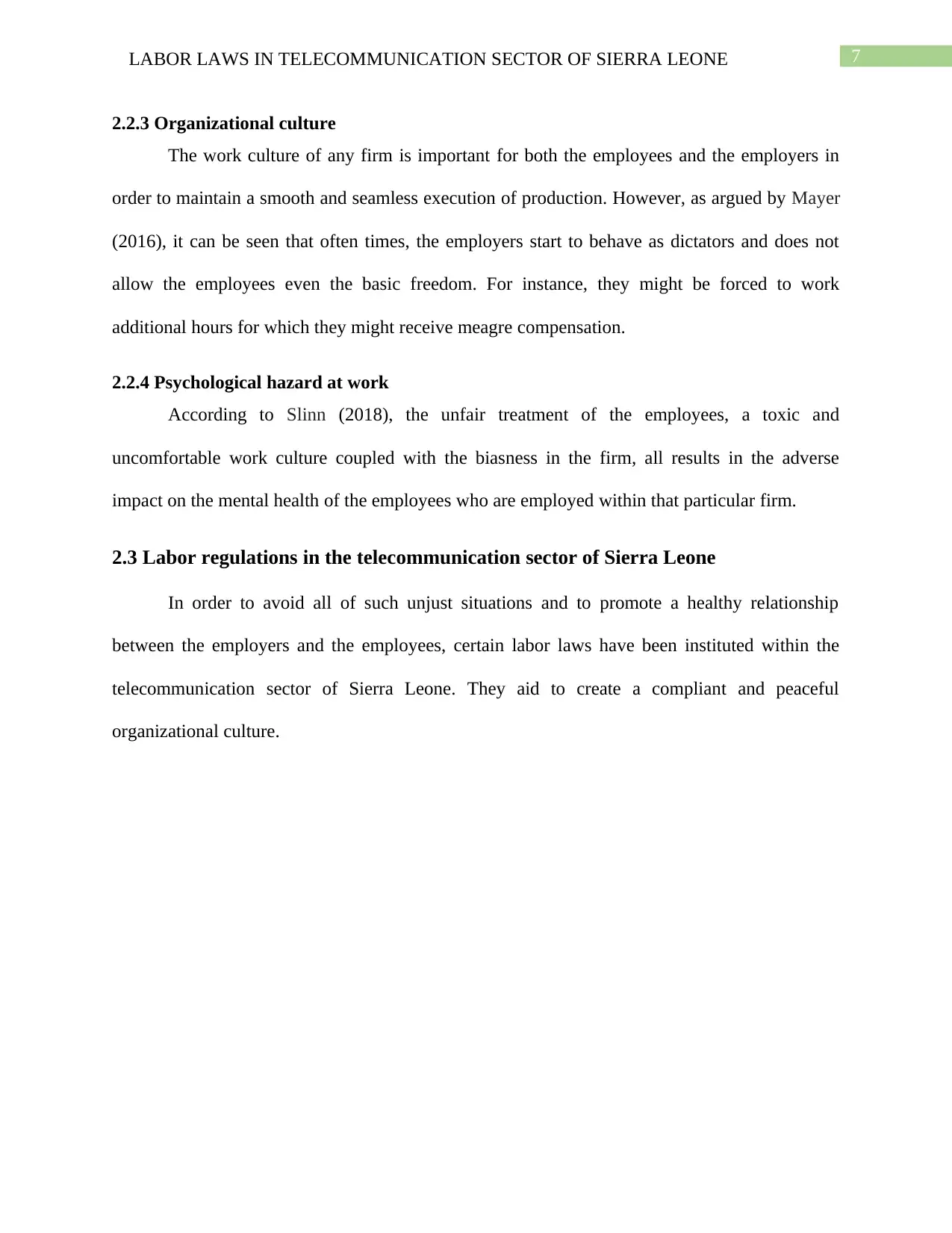
7LABOR LAWS IN TELECOMMUNICATION SECTOR OF SIERRA LEONE
2.2.3 Organizational culture
The work culture of any firm is important for both the employees and the employers in
order to maintain a smooth and seamless execution of production. However, as argued by Mayer
(2016), it can be seen that often times, the employers start to behave as dictators and does not
allow the employees even the basic freedom. For instance, they might be forced to work
additional hours for which they might receive meagre compensation.
2.2.4 Psychological hazard at work
According to Slinn (2018), the unfair treatment of the employees, a toxic and
uncomfortable work culture coupled with the biasness in the firm, all results in the adverse
impact on the mental health of the employees who are employed within that particular firm.
2.3 Labor regulations in the telecommunication sector of Sierra Leone
In order to avoid all of such unjust situations and to promote a healthy relationship
between the employers and the employees, certain labor laws have been instituted within the
telecommunication sector of Sierra Leone. They aid to create a compliant and peaceful
organizational culture.
2.2.3 Organizational culture
The work culture of any firm is important for both the employees and the employers in
order to maintain a smooth and seamless execution of production. However, as argued by Mayer
(2016), it can be seen that often times, the employers start to behave as dictators and does not
allow the employees even the basic freedom. For instance, they might be forced to work
additional hours for which they might receive meagre compensation.
2.2.4 Psychological hazard at work
According to Slinn (2018), the unfair treatment of the employees, a toxic and
uncomfortable work culture coupled with the biasness in the firm, all results in the adverse
impact on the mental health of the employees who are employed within that particular firm.
2.3 Labor regulations in the telecommunication sector of Sierra Leone
In order to avoid all of such unjust situations and to promote a healthy relationship
between the employers and the employees, certain labor laws have been instituted within the
telecommunication sector of Sierra Leone. They aid to create a compliant and peaceful
organizational culture.
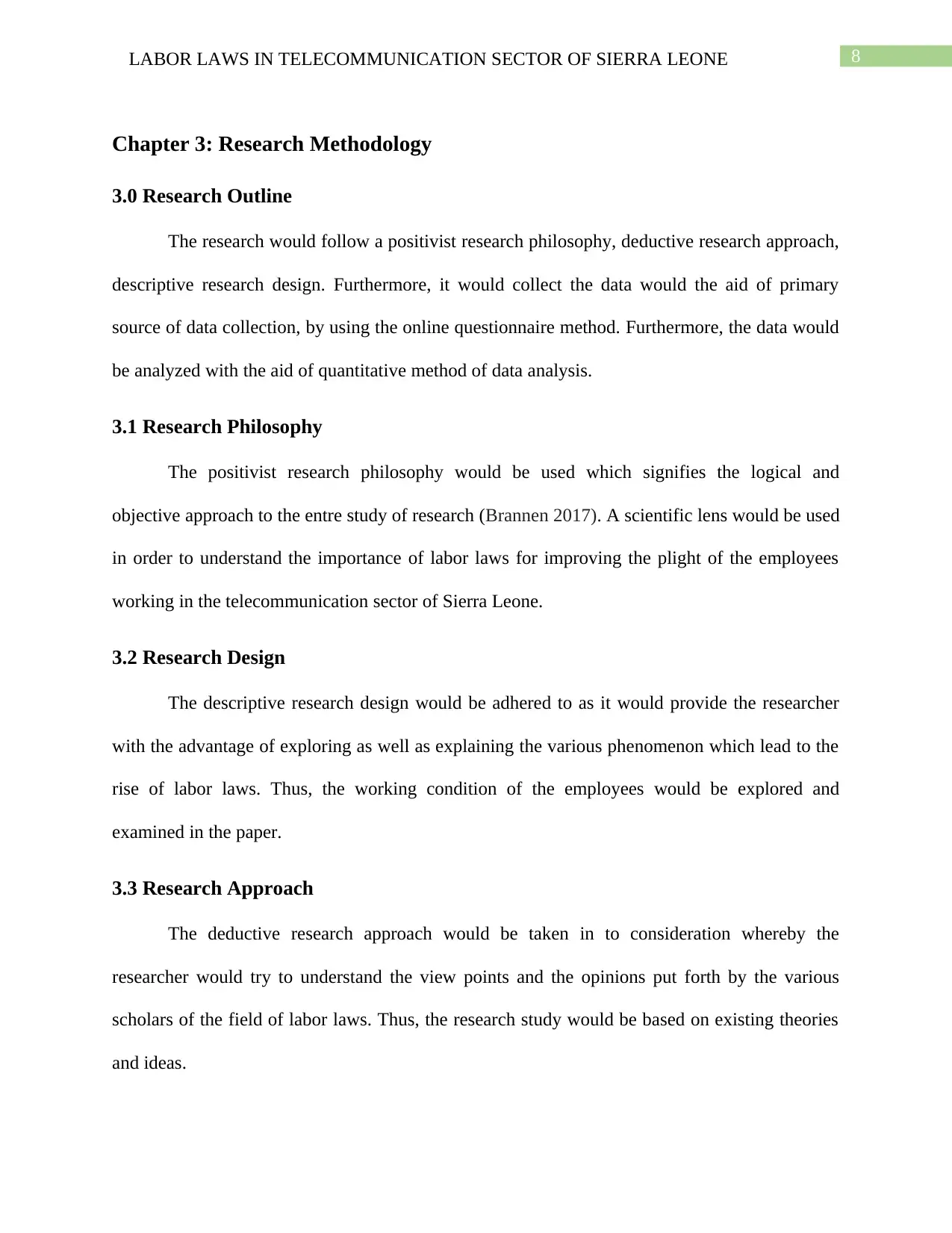
8LABOR LAWS IN TELECOMMUNICATION SECTOR OF SIERRA LEONE
Chapter 3: Research Methodology
3.0 Research Outline
The research would follow a positivist research philosophy, deductive research approach,
descriptive research design. Furthermore, it would collect the data would the aid of primary
source of data collection, by using the online questionnaire method. Furthermore, the data would
be analyzed with the aid of quantitative method of data analysis.
3.1 Research Philosophy
The positivist research philosophy would be used which signifies the logical and
objective approach to the entre study of research (Brannen 2017). A scientific lens would be used
in order to understand the importance of labor laws for improving the plight of the employees
working in the telecommunication sector of Sierra Leone.
3.2 Research Design
The descriptive research design would be adhered to as it would provide the researcher
with the advantage of exploring as well as explaining the various phenomenon which lead to the
rise of labor laws. Thus, the working condition of the employees would be explored and
examined in the paper.
3.3 Research Approach
The deductive research approach would be taken in to consideration whereby the
researcher would try to understand the view points and the opinions put forth by the various
scholars of the field of labor laws. Thus, the research study would be based on existing theories
and ideas.
Chapter 3: Research Methodology
3.0 Research Outline
The research would follow a positivist research philosophy, deductive research approach,
descriptive research design. Furthermore, it would collect the data would the aid of primary
source of data collection, by using the online questionnaire method. Furthermore, the data would
be analyzed with the aid of quantitative method of data analysis.
3.1 Research Philosophy
The positivist research philosophy would be used which signifies the logical and
objective approach to the entre study of research (Brannen 2017). A scientific lens would be used
in order to understand the importance of labor laws for improving the plight of the employees
working in the telecommunication sector of Sierra Leone.
3.2 Research Design
The descriptive research design would be adhered to as it would provide the researcher
with the advantage of exploring as well as explaining the various phenomenon which lead to the
rise of labor laws. Thus, the working condition of the employees would be explored and
examined in the paper.
3.3 Research Approach
The deductive research approach would be taken in to consideration whereby the
researcher would try to understand the view points and the opinions put forth by the various
scholars of the field of labor laws. Thus, the research study would be based on existing theories
and ideas.
⊘ This is a preview!⊘
Do you want full access?
Subscribe today to unlock all pages.

Trusted by 1+ million students worldwide
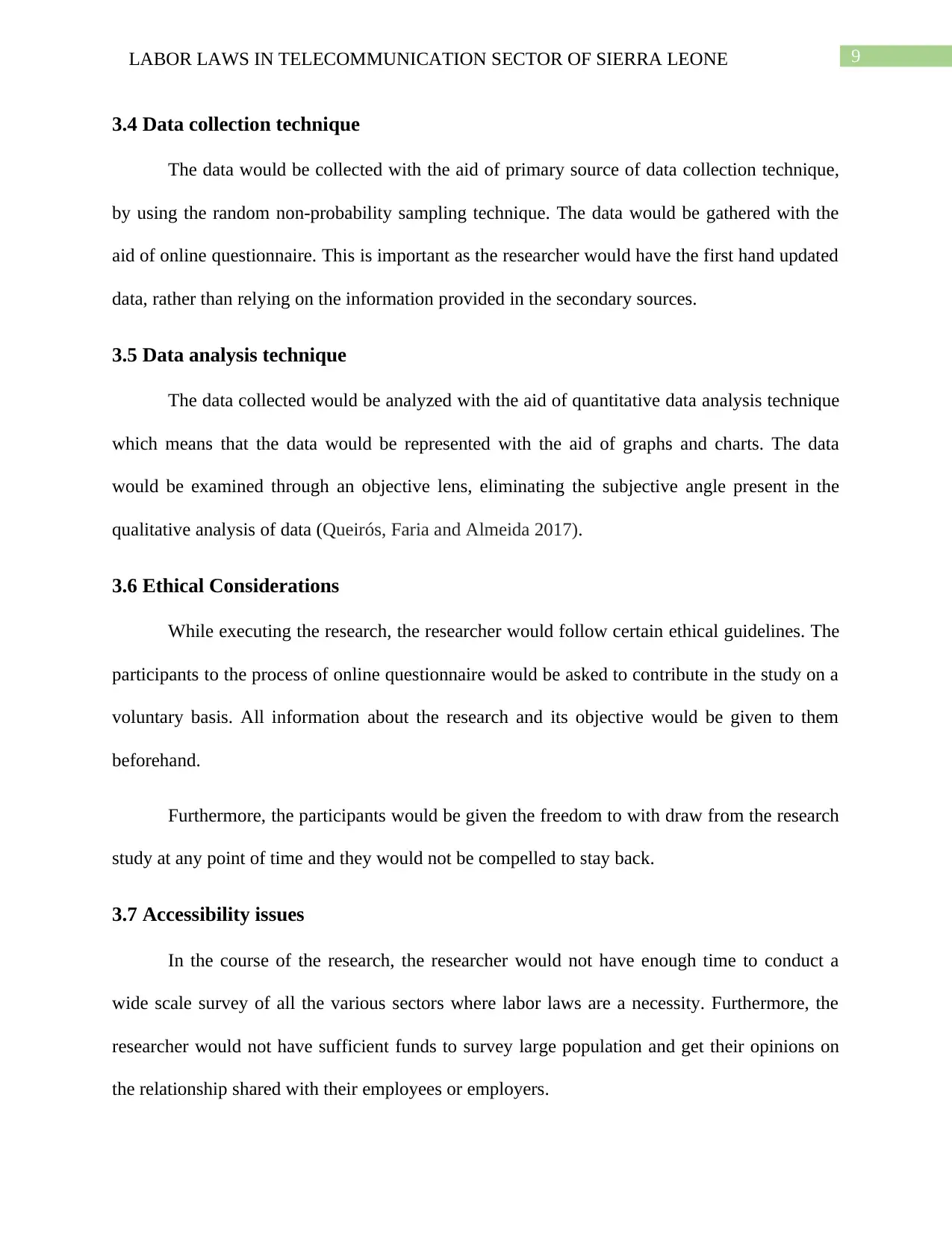
9LABOR LAWS IN TELECOMMUNICATION SECTOR OF SIERRA LEONE
3.4 Data collection technique
The data would be collected with the aid of primary source of data collection technique,
by using the random non-probability sampling technique. The data would be gathered with the
aid of online questionnaire. This is important as the researcher would have the first hand updated
data, rather than relying on the information provided in the secondary sources.
3.5 Data analysis technique
The data collected would be analyzed with the aid of quantitative data analysis technique
which means that the data would be represented with the aid of graphs and charts. The data
would be examined through an objective lens, eliminating the subjective angle present in the
qualitative analysis of data (Queirós, Faria and Almeida 2017).
3.6 Ethical Considerations
While executing the research, the researcher would follow certain ethical guidelines. The
participants to the process of online questionnaire would be asked to contribute in the study on a
voluntary basis. All information about the research and its objective would be given to them
beforehand.
Furthermore, the participants would be given the freedom to with draw from the research
study at any point of time and they would not be compelled to stay back.
3.7 Accessibility issues
In the course of the research, the researcher would not have enough time to conduct a
wide scale survey of all the various sectors where labor laws are a necessity. Furthermore, the
researcher would not have sufficient funds to survey large population and get their opinions on
the relationship shared with their employees or employers.
3.4 Data collection technique
The data would be collected with the aid of primary source of data collection technique,
by using the random non-probability sampling technique. The data would be gathered with the
aid of online questionnaire. This is important as the researcher would have the first hand updated
data, rather than relying on the information provided in the secondary sources.
3.5 Data analysis technique
The data collected would be analyzed with the aid of quantitative data analysis technique
which means that the data would be represented with the aid of graphs and charts. The data
would be examined through an objective lens, eliminating the subjective angle present in the
qualitative analysis of data (Queirós, Faria and Almeida 2017).
3.6 Ethical Considerations
While executing the research, the researcher would follow certain ethical guidelines. The
participants to the process of online questionnaire would be asked to contribute in the study on a
voluntary basis. All information about the research and its objective would be given to them
beforehand.
Furthermore, the participants would be given the freedom to with draw from the research
study at any point of time and they would not be compelled to stay back.
3.7 Accessibility issues
In the course of the research, the researcher would not have enough time to conduct a
wide scale survey of all the various sectors where labor laws are a necessity. Furthermore, the
researcher would not have sufficient funds to survey large population and get their opinions on
the relationship shared with their employees or employers.
Paraphrase This Document
Need a fresh take? Get an instant paraphrase of this document with our AI Paraphraser
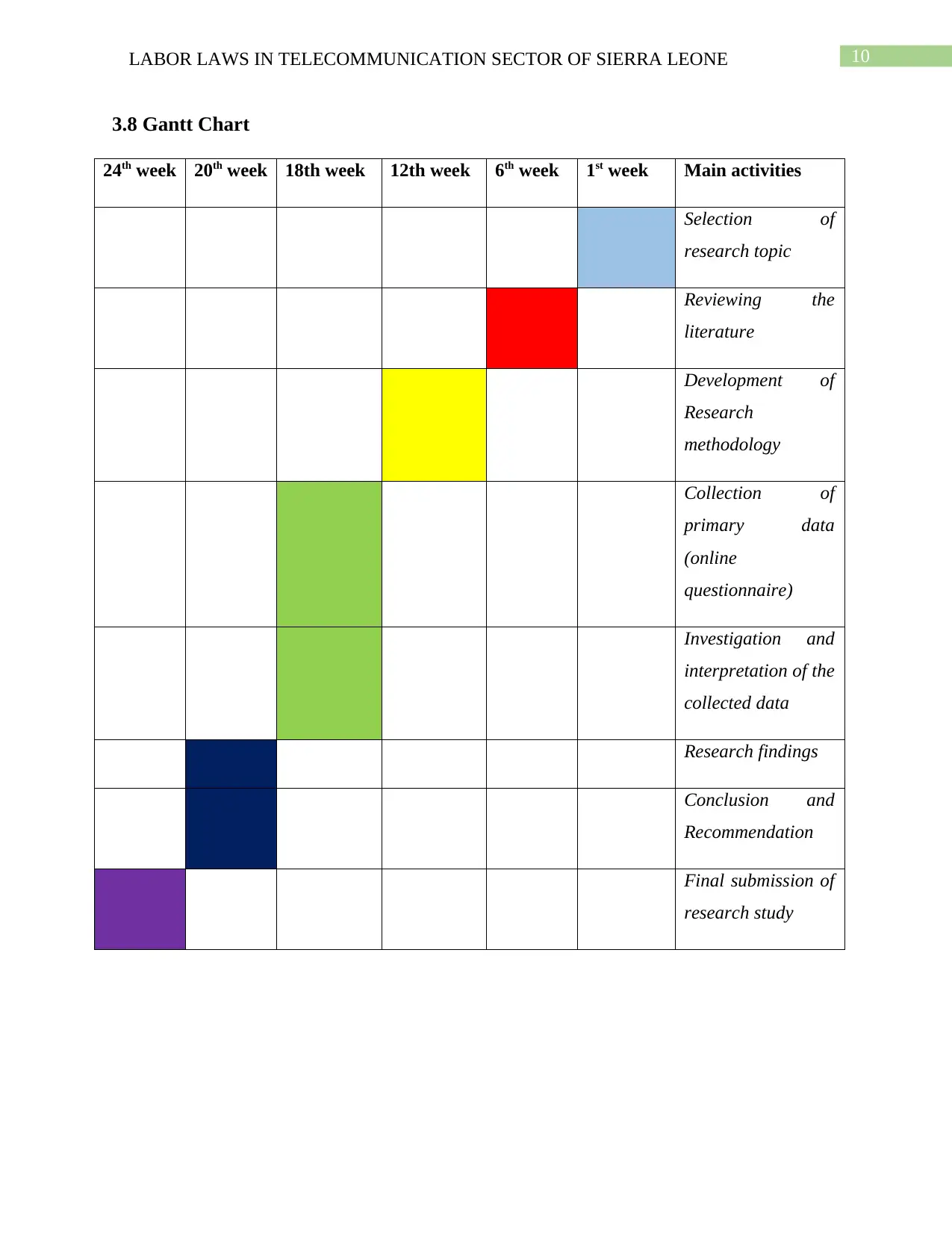
10LABOR LAWS IN TELECOMMUNICATION SECTOR OF SIERRA LEONE
3.8 Gantt Chart
Main activities1st week6th week12th week18th week20th week24th week
Selection of
research topic
Reviewing the
literature
Development of
Research
methodology
Collection of
primary data
(online
questionnaire)
Investigation and
interpretation of the
collected data
Research findings
Conclusion and
Recommendation
Final submission of
research study
3.8 Gantt Chart
Main activities1st week6th week12th week18th week20th week24th week
Selection of
research topic
Reviewing the
literature
Development of
Research
methodology
Collection of
primary data
(online
questionnaire)
Investigation and
interpretation of the
collected data
Research findings
Conclusion and
Recommendation
Final submission of
research study
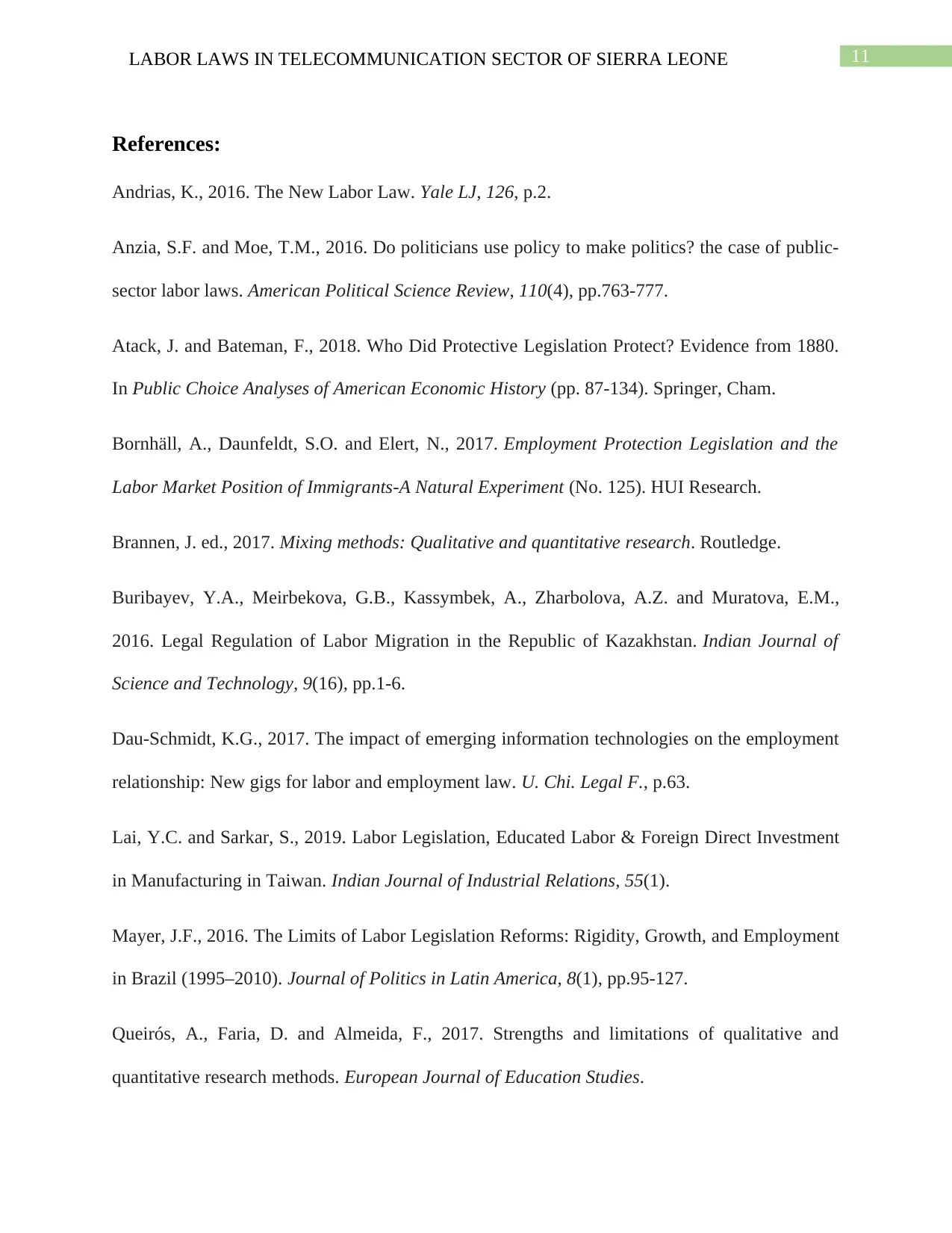
11LABOR LAWS IN TELECOMMUNICATION SECTOR OF SIERRA LEONE
References:
Andrias, K., 2016. The New Labor Law. Yale LJ, 126, p.2.
Anzia, S.F. and Moe, T.M., 2016. Do politicians use policy to make politics? the case of public-
sector labor laws. American Political Science Review, 110(4), pp.763-777.
Atack, J. and Bateman, F., 2018. Who Did Protective Legislation Protect? Evidence from 1880.
In Public Choice Analyses of American Economic History (pp. 87-134). Springer, Cham.
Bornhäll, A., Daunfeldt, S.O. and Elert, N., 2017. Employment Protection Legislation and the
Labor Market Position of Immigrants-A Natural Experiment (No. 125). HUI Research.
Brannen, J. ed., 2017. Mixing methods: Qualitative and quantitative research. Routledge.
Buribayev, Y.A., Meirbekova, G.B., Kassymbek, A., Zharbolova, A.Z. and Muratova, E.M.,
2016. Legal Regulation of Labor Migration in the Republic of Kazakhstan. Indian Journal of
Science and Technology, 9(16), pp.1-6.
Dau-Schmidt, K.G., 2017. The impact of emerging information technologies on the employment
relationship: New gigs for labor and employment law. U. Chi. Legal F., p.63.
Lai, Y.C. and Sarkar, S., 2019. Labor Legislation, Educated Labor & Foreign Direct Investment
in Manufacturing in Taiwan. Indian Journal of Industrial Relations, 55(1).
Mayer, J.F., 2016. The Limits of Labor Legislation Reforms: Rigidity, Growth, and Employment
in Brazil (1995–2010). Journal of Politics in Latin America, 8(1), pp.95-127.
Queirós, A., Faria, D. and Almeida, F., 2017. Strengths and limitations of qualitative and
quantitative research methods. European Journal of Education Studies.
References:
Andrias, K., 2016. The New Labor Law. Yale LJ, 126, p.2.
Anzia, S.F. and Moe, T.M., 2016. Do politicians use policy to make politics? the case of public-
sector labor laws. American Political Science Review, 110(4), pp.763-777.
Atack, J. and Bateman, F., 2018. Who Did Protective Legislation Protect? Evidence from 1880.
In Public Choice Analyses of American Economic History (pp. 87-134). Springer, Cham.
Bornhäll, A., Daunfeldt, S.O. and Elert, N., 2017. Employment Protection Legislation and the
Labor Market Position of Immigrants-A Natural Experiment (No. 125). HUI Research.
Brannen, J. ed., 2017. Mixing methods: Qualitative and quantitative research. Routledge.
Buribayev, Y.A., Meirbekova, G.B., Kassymbek, A., Zharbolova, A.Z. and Muratova, E.M.,
2016. Legal Regulation of Labor Migration in the Republic of Kazakhstan. Indian Journal of
Science and Technology, 9(16), pp.1-6.
Dau-Schmidt, K.G., 2017. The impact of emerging information technologies on the employment
relationship: New gigs for labor and employment law. U. Chi. Legal F., p.63.
Lai, Y.C. and Sarkar, S., 2019. Labor Legislation, Educated Labor & Foreign Direct Investment
in Manufacturing in Taiwan. Indian Journal of Industrial Relations, 55(1).
Mayer, J.F., 2016. The Limits of Labor Legislation Reforms: Rigidity, Growth, and Employment
in Brazil (1995–2010). Journal of Politics in Latin America, 8(1), pp.95-127.
Queirós, A., Faria, D. and Almeida, F., 2017. Strengths and limitations of qualitative and
quantitative research methods. European Journal of Education Studies.
⊘ This is a preview!⊘
Do you want full access?
Subscribe today to unlock all pages.

Trusted by 1+ million students worldwide
1 out of 13
Related Documents
Your All-in-One AI-Powered Toolkit for Academic Success.
+13062052269
info@desklib.com
Available 24*7 on WhatsApp / Email
![[object Object]](/_next/static/media/star-bottom.7253800d.svg)
Unlock your academic potential
Copyright © 2020–2025 A2Z Services. All Rights Reserved. Developed and managed by ZUCOL.




